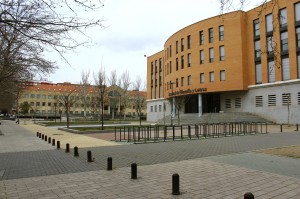
By Gloria Magallanes
Culture shock is the phrase that comes to mind when people ask me about my experience abroad last semester.
I believe that in order to go abroad, students should be aware that it takes a little more effort than meets the eye. Students need to prepare themselves for the adjustment of living in a new country.
The process of applying isn’t as tedious as students may presume. As long as you turn in all the required paperwork, you are free to begin your preparation to live abroad. Many students may also be concerned about the price of studying abroad, assuming it is very expensive. In reality, it is not as bad as it seems.
I was relieved to find out that the projected expenses were accurate with my stay abroad in Valladolid, Spain. For those receiving FAFSA, you are fortunate enough to get some of your expenses covered. There are many other financial aid opportunities if you are lacking funds. The Global Education Office offers a variety of scholarships to apply for, and there is always the option of accepting subsidized loans if necessary.
The amazing thing about studying in Spain is that it is affordable. However, students need to learn how to manage their bank account and budget. Students should save their money for traveling with friends on the weekends. American students also have an advantage, being that they are a native English speaker. There are many locals willing to pay to have English speakers tutor them in the evenings, and that extra cash can be helpful.
The university system in Europe is very different from the American educational system. Spanish professors don’t assign weekly homework assignments, take roll call, count anything as participation or give midterms. Students are free from homework the entire semester. Although this might seem like heaven for many, it doesn’t really feel like heaven in the last weeks leading up to the final exam. The professors rely solely on the student’s final exam grade, as they have nothing else to base their scores off of. Talk about pressure.
The way they teach is different as well. Professors rarely use PowerPoints or a whiteboard to help with their lessons. They only give lectures. Spanish students also have a different method of writing notes. Instead of bullet points or summaries of the lectures, they write the entire lecture out, word by word from what the professor says.
There really is nothing similar about CSUSM and the university I attended in Spain. We are accustomed to having our university located on the same property. In Spain, the university is divided into buildings according to the area of study and they are called faculties. These faculties are dispersed around the city. Students won’t see themselves going to the same faculty as a business major if they are studying languages. Although this may seem strange, in reality it is beneficial. Students get to know everyone in their faculty and it gives them the opportunity to meet local Spanish students in a tight-nit environment. The cafeteria ladies even seem to enjoy the presence of students’ familiar faces.
Although all this information might seem like a turn-off, believe me when I say I would do it all over again. Maria Lopez, a fellow CSUSM student, recent returnee, as well as my companion and roommate in Spain, also really enjoyed her experience.
“I absolutely loved it, I feel that as students we should take every opportunity that we have to grow as individuals and studying abroad is one of them,” Lopez said.
Studying and living in a different country is such an unforgettable and impacting experience. The people one meets, the places one sees and the overall environment is something that will become a part of that person forever. Students will gain greater understanding about other cultures and customs.
If you are a student thinking of going abroad, don’t let the opportunity pass you by. Go abroad. I encourage you to be bold and courageous, you won’t regret it.

